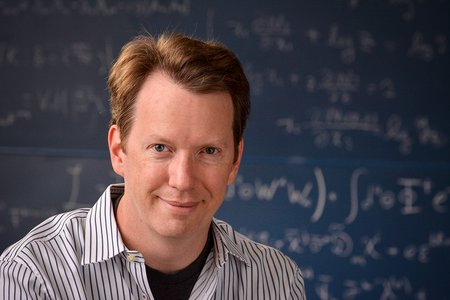Most people think about time throughout the day, but Sean Carroll, research professor of physics at Caltech, notes that very few people appreciate just how "weird" time is.
Carroll points out that in space, for instance, you can go from point A to point B and back again—but once you leave a given point in time, you can never return to that moment. Speaking to a packed Hameetman Auditorium on July 6, he told the crowd, "You could say, 'This is the most boring lecture I've ever heard. I will get up and walk away.' But you cannot choose to have not come to the lecture. Right? You cannot make a choice right now about the past. Why is that?"
Carroll's 45-minute lecture was part of the weekly Innovation Speaker Series science and technology talks presented each Thursday through August 3 by Summer App Space—a summer apprenticeship for 15 LA students and teachers to learn programming while getting paid to do real world space-related projects. The speaker series, which features entrepreneurs, researchers, and technologists from Caltech and elsewhere, aims to showcase the ways in which people with science- and space-related backgrounds and education can help change the world.
During his lecture, Carroll led an audience that included middle- and high-school students—as well as Caltech students, staff, and faculty, who are welcome to attend these public talks—on a tour of physics, quantum mechanics, and cosmology that examined what science can tell us about the origins of existence. Covering theories that delved into what happened before the Big Bang and what might occur when the universe ends, he also discussed how time might frame our perspective of the universe.
"Is any of this true?" he asked, referring to what happened before the Big Bang. "Who knows? I don't know. That's why we do physics. Physics is not about solving problems that you can see the solution to in the back of the book. It's about asking questions we don't know the answers to, suggesting possibilities, figuring out what those possibilities predict, and going out and collecting data and seeing which one is right."
• • •
The Innovation Speaker Series will feature two speakers each Thursday, one at 8 a.m. and one at 8:45 a.m., in Hameetman Auditorium. The schedule for the remaining lectures is as follows:
Thursday, July 20:
• 8 a.m.: Adam Lichtl, founder and CEO of Delta Brain Inc.
• 8:45 a.m.: Solange Ramírez, associate staff scientist at the NASA Exoplanet Science Institute
Thursday, July 27
• 8 a.m.: Theoretical astrophysicist Jorge Moreno
• 8:45 a.m.: Silicon Valley entrepreneur and Westworld actress Talulah Riley
Thursday, August 3
• 8 a.m.: Caltech postdoc and member of the 2017 NASA astronaut class Jessica Watkins
• 8:45 a.m.: Jessie Christiansen, Caltech astronomer at the NASA Exoplanet Science Institute
 Sean Carroll, research professor of physics at Caltech, recently spoke on physics and cosmology as part of the Innovation Speaker Series.
Credit: Caltech
Sean Carroll, research professor of physics at Caltech, recently spoke on physics and cosmology as part of the Innovation Speaker Series.
Credit: Caltech

